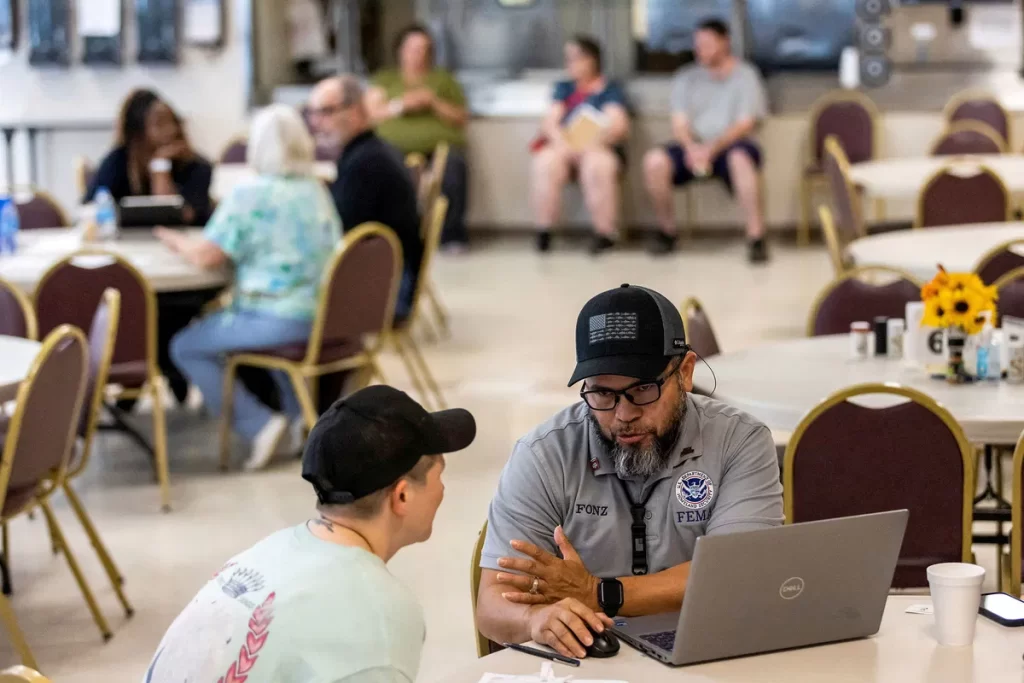How to Apply for FEMA Aid After Hurricanes Helene and Milton
3 min read
FEMA staff work with local residents affected by floods resulting from Hurricane Helene, in Marion, North Carolina, on October 5. Eduardo Munoz/Reuters

FEMA staff work with local residents affected by floods resulting from Hurricane Helene, in Marion, North Carolina, on October 5. Eduardo Munoz/Reuters
Following the devastating impacts of Hurricanes Helene and Milton on the Southeastern U.S., the federal government is offering various assistance programs for affected individuals. To access this crucial funding, residents must submit applications to the U.S. Federal Emergency Management Agency (FEMA).
Currently, aid for Hurricane Helene victims is available, while those affected by Hurricane Milton will need to wait for an official federal disaster declaration before applying. Here’s what you need to know about the application process and available assistance.
There are three primary methods to apply for FEMA assistance:
For residents impacted by both hurricanes, FEMA Administrator Deanne Criswell has indicated that two separate applications will need to be submitted—one for each storm.
To qualify for FEMA assistance, individuals must reside in a declared disaster area. Applicants or a household member must be a U.S. citizen, noncitizen national, or a qualified noncitizen. Applicants will need to provide their Social Security number to verify their identity.
FEMA will also confirm that the damaged property is the applicant’s primary residence. In some cases, an inspector may be dispatched to assess the damage. Generally, FEMA aid covers home repair expenses that insurance does not.
The federal government administers multiple disaster assistance programs through FEMA and the Small Business Administration (SBA). Here are the main types of aid available:
In addition to federal aid, disaster victims may also qualify for assistance from state and local organizations, as well as nonprofits like the American Red Cross. The Red Cross has been active in Florida, providing shelter and relief supplies to affected communities.
The state of Florida has its own Disaster Fund, which distributes donations to service organizations across the state to aid impacted areas. More information about local resources can be found at DisasterAssistance.gov.
The Internal Revenue Service (IRS) is also providing support to individuals in FEMA-designated disaster areas. Taxpayers can call the IRS disaster hotline at 866-562-5227 for further assistance.
Residents of Alabama, Georgia, North Carolina, South Carolina, and parts of Florida, Tennessee, and Virginia affected by Hurricane Helene have until May 1 to file federal individual and business tax returns and make tax payments. This extension also applies to Hurricane Milton victims in 51 Florida counties.
Additionally, those who have experienced property loss or damage due to a federally declared disaster may qualify for a casualty loss deduction, potentially increasing their tax refund. Taxpayers who have lost important records can obtain tax return transcripts online or request copies by filing Form 4506.
Some small business owners may also benefit from COVID-era tax credits, with the IRS processing around 400,000 claims valued at approximately $10 billion, although some applications have faced delays due to fraud concerns.
As recovery efforts continue, it’s essential for those impacted by Hurricanes Helene and Milton to understand their options for assistance and take action promptly to secure the aid they need.